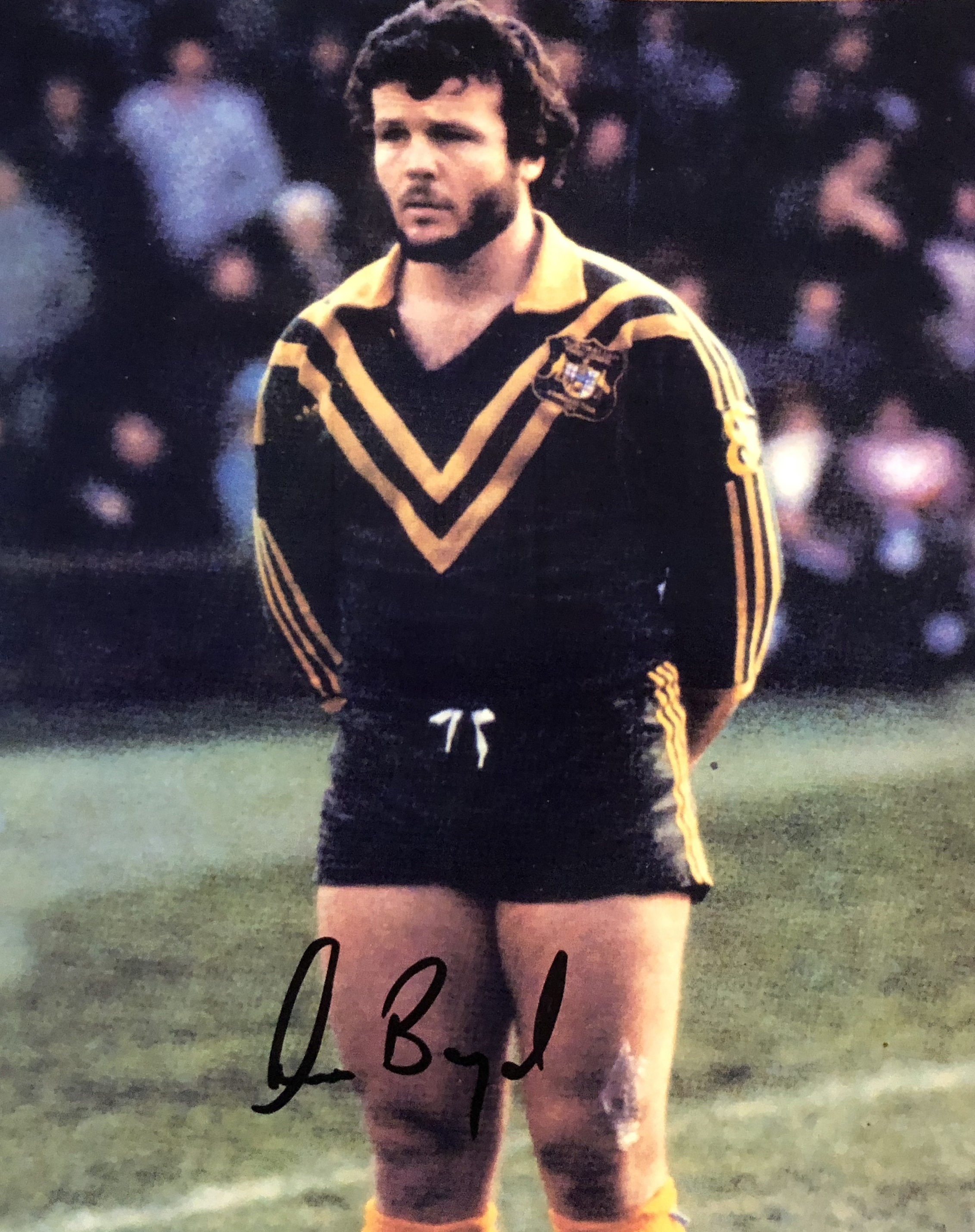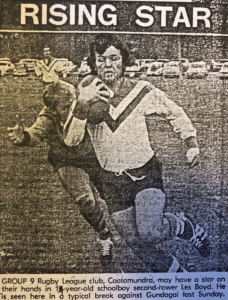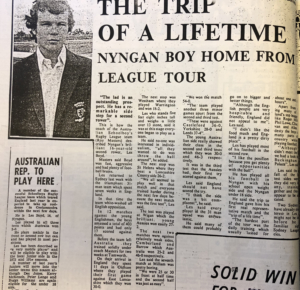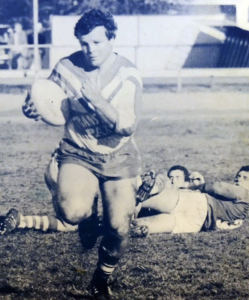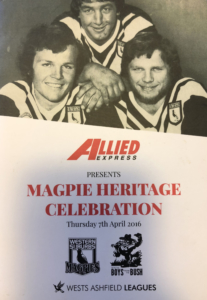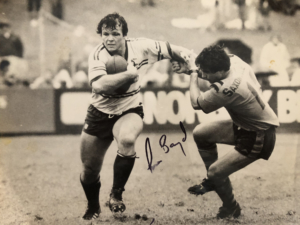The Times will be bringing back our most popular segment. Our Local Legend Stories. We have told the story of well over 100 local people who have contributed to their field or their local community. Some have contributed to both.
Les Boyd made a huge contribution to Rugby League at a local, state, national and international level.
We are very happy to bring you our story on Les Boyd and will bring you more Local Legends soon. Enjoy.
State of Origin is State against State and Mate against Mate. This hasn’t changed over the years, but the game has changed a lot over the last few decades, as has the way the game is promoted. There is continual build up of hype. There is a whole week of promotion leading up to it and months before that promoting the series.
When it comes to State of Origin, Local Rugby League Legend Les Boyd is just as excited to watch the Women’s State of Origin and the upcoming test matches as he is watching the Men’s series. He likes the fact international Rugby League is becoming stronger across the board. He said, “It’s good for our game.” The women play the game the way Les likes it. They don’t mess around, they play it hard and direct and don’t get into putting too many people into the tackles or wrestling.
He said, “They play the way it should be played, the game is better each year. They hit hard in defence. The men’s game, they try and control it too much and they try and get players into certain positions. The women get stuck in and have a go, they don’t slow it down, sometimes I think they play a better style than the men.”
Les watches a wide range of sports including Rugby Union, Soccer and League and will be watching the Women’s match tonight. Although he hasn’t played for years now, he still has an interest, but it certainly doesn’t consume him.
Les is now happily semi-retired. He spends his time on his farm now and when he can, goes fishing and shooting and also looks after his 4 grandkids.
On a recent trip he was reeling in a nice Yellowbelly, around 2 and a half pounds, when a Cod came along and took the Yellowbelly which landed him an even bigger fish.
Les was born in Nyngan in 1956 and grew up on the family farm with 6 kids in his family. His childhood was like most other kids, in that it was carefree. He said, “I was probably like every other kid, building sandcastles and kicking daisies until I was 13 or 14 and the penny dropped, you know that you can have a bit more influence on the game.”
In 72 Les made the Australian Schoolboys side and first tried out for the Schoolboy Opens side as a 15 year old, before a teacher let him know that they were picking an Australian team to go to England in the U16s.
Soon after Les returned, his father decided to move the family to Coota and his sister was working in the local bank which made it a comfortable move.
He started school in January 73 and did his final 2 years of schooling at Cootamundra High, before leaving for Sydney in 76.
Les played with a couple of his High School teachers on Sunday. “It was always pretty respectful but it was a bit different, they would be playing football with them on Sunday and they would be teaching me on Monday.”
Roy Masters was his coach in the schoolboy’s side and was based at Penrith before moving to Wests to coach the U23s.
They were looking for a Lock forward. Les flew down on the Thursday, had one training run and played the competition game on the Saturday.
He had just turned 18.
They played the Roosters who had 13 internationals playing for them. Arthur Beetson being one such player.
Les’ side beat them. When the ball was kicked off it landed in his arms near the dead ball line and “The Coota kid” was underway.
Les took a job with the Sun Newspaper in Sydney while he was playing Rugby League. He would organise events for other stars including poster signings, promotions and advertising, with the likes of Tina Turner, Dennis Lillee, Ted Mulry and the Ella brothers. He spent 7 years in the role and loved it.
Les played at Wests in 76,77,78 and 79 before moving to Manly from 80,81,82, and 83.
When he came back to Coota in 83, he and wife Judy had plans to build a house on a hill near Coota but fell in love with a house in the township and bought it, they have stayed there ever since.
Les puts his on field fire down to competitiveness, where he grew up on a farm, one of 6 kids. “I was always a competitive person and I just had a will to win and a want to win, that is what I can put it down to.”
Les went to England to play in 84 and played in a very good side at Warrington with Brian Johnson who had previously been at St. George. Phil Blake was also a starter at the Wolves along with Les Davidson while Steve Roach played a season. They won the 85/86 comp.
Les will be returning to Warrington in September and will be taking part in a couple of sports night. “I had a great time there and really enjoyed my football and should have stayed longer.”
The shoulder charge has since left the game but when Les played it was part of the game. He said, “I’ve been hit with some good ones in my time and probably hit a few people with some aswell, but I can probably understand why the game has got to where it has, to protect people. I don’t remember a lot of people getting hurt badly at the time from a shoulder charge but I can understand when one person gets really hurt it is probably one too many. I can remember a couple of times when pressure was unbelievable from what they call Crusher tackles now. I think it has been brought about by teaching players to dominate in tackles.”
Les and some business associates started O’Malleys which was a liquor supply business which he worked in for 8 years.
He would travel to England and play in the English League for 6 months and return to Coota and work for the company for the other 6 months, 5 years in a row. “I loved England, good people and I enjoyed the football it was my style of attacking footy.”
Les has often been criticised for his playing style but some of it is unwarranted. He said, “I got sent off 3 times in 77 all for fighting, in the Sydney comp I never got sent off once more, but I got sighted twice. I only got sent off in England once in 5 years.”
Les was doing what Front Rowers did, which was not take a backward step and let his opposition Front Rower get away with any rubbish. They got in to a punch up and both players were sent off.
Les played upwards of 400 games of first grade football in a time when the game was different, where players had to dominate their opposition and intimidate them. Les said, “There were blokes sent off more than me, but didn’t get the suspensions I got.”
Les thinks that a 5 minute sin bin would be a better option in today’s game. 10 minutes in the bin is a big disadvantage.
He said, “I saw Latrell Mitchell a few years ago and said he would play for Australia. He is only 21 or 22. It is a shame that when we start our career we don’t know what we do at the end of our careers. It’s very hard for a young bloke to come in and do a job sometimes.”
Les remembers his own career in the early days where he was the leading try scorer half way through the year in 76 and came home after playing every game for Wests. In 77 he said, “I had a shit year, I came home for the off season and I was drinking 6 or 7 schooners in the off season. I put on a stone or 2 in weight, went back down and thought it was going to be easy. I got sent off a couple of times through frustration and fighting. Something clicks and you make changes.”
On a local level, Les coached for 5 years at Coota and 2 years at Harden. He said, “We should have won the comp at Harden. We had some really good players, Chris Ward, Peter Pobjie, Michael Quinn, Bruno, Timmy Davis, Barry Edwards, young Hock. They had that team for many years and it was a strong foundation for many years. Gavin Dyball’s timing in defence was amazing. He would put the ball under his arm and run straight in attack and in defence he was lethal. His defence was very very good. Chris Ward was a freak. Michael Quinn for a big man had a good step and was good with the ball and Peter Leitner was very talented, he won a comp with Coota.”
Les said, “Bobby Priest was a genie he went out and played for Griffith Waratahs and won about 6 premierships. Paul Field from Coolac, Chrissy Roberts and the Wilson boys, David Hand. All of those blokes were excellent players. Coota should have won the comp in 75. We were beaten by Harden by 2 points at Temora. Big Charlie Dyball, Paul Glover, Jackie Whybrow and John Shea were all playing for Harden in those days.
Les is now happily retired but has not been far from people’s minds. He has had a street named after him in Coota and the the Oval is now called Les Boyd Oval.
We would like to thank Les for taking the time to speak with the Times. There is no doubt Les was a formidable player on the Rugby League paddock and there is no doubt he is a gentlemen off it.
Thanks Les

